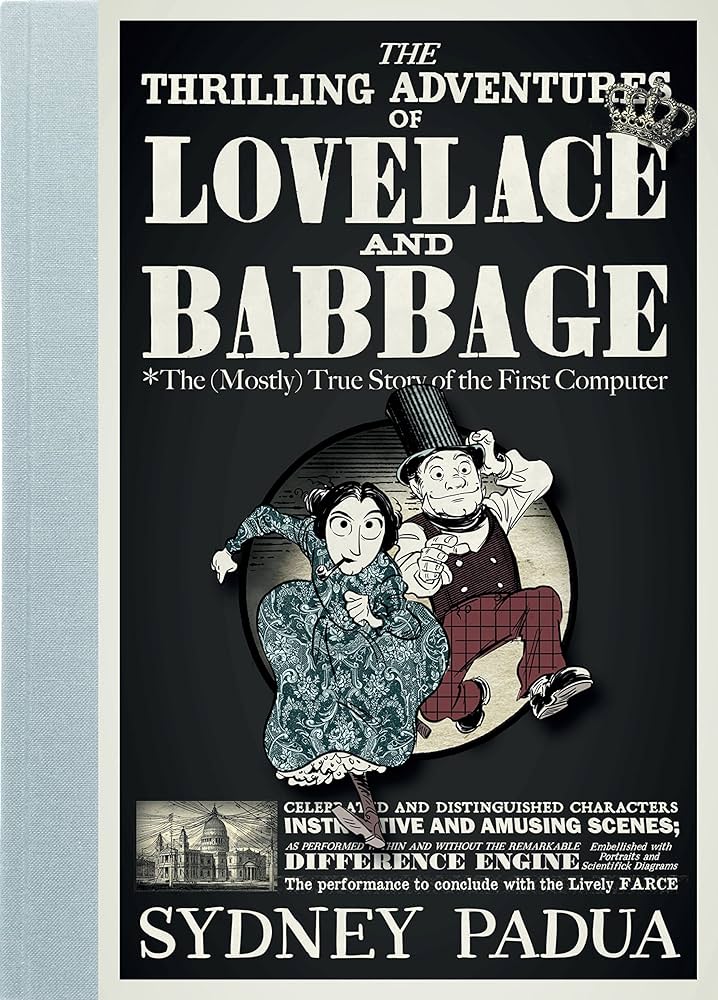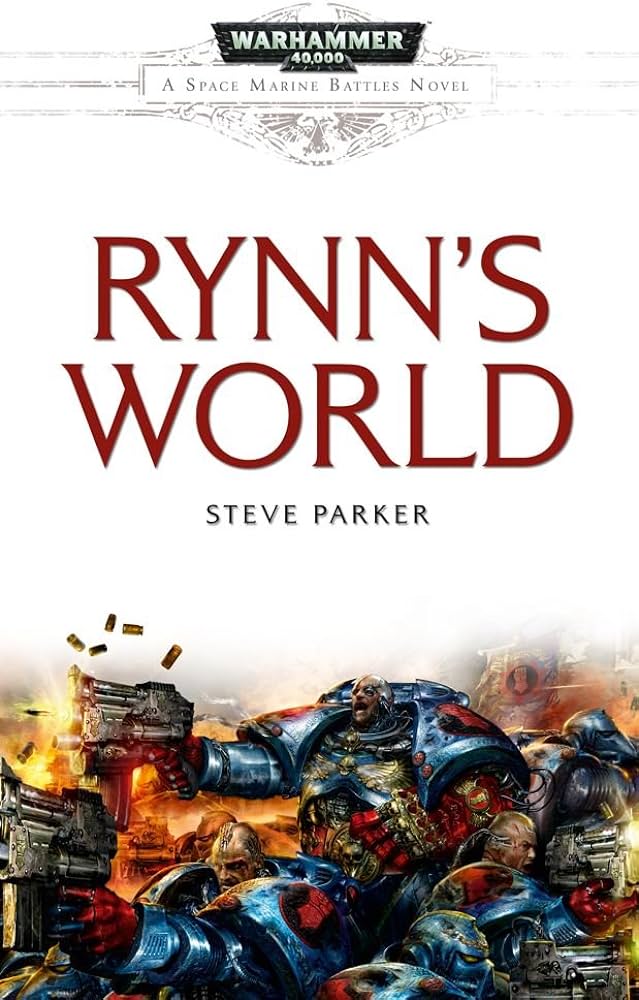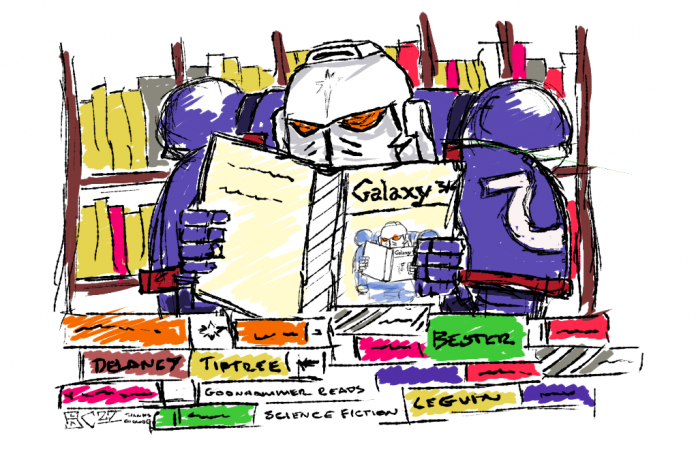Welcome to the end of history. The Wall is crumbling and will soon fall. Capitalism, so long merely one of the world’s competing economic systems is on the verge of absolute, final, conclusive “victory”, at least in the minds of its adherents. The Iran-Contra scheme is in full swing, and fallout softly rains over Western Europe but seemingly no-one really gives a shit because it’s America, Baby! Welcome to the first in a trilogy: Goonhammer Reads the Long Nineties.
Before we dive in, I probably owe you all a bit of an explanation. I was born in the Eighties, and I’d say that I define my childhood as bounded by two memories – the fall of the Wall and the fall of the Towers. In between was the Nineties, the endless boom, the rise of centrism as a “legitimate” political philosophy, a wide range of highly-coloured jackets, and, in the UK at least, the gradual disappearance of white dogshit off the streets.

“I don’t know why they’re celebrating, I’ve lost my job” remains the single funniest joke about the fall of communism. West and East Germans at the Brandenburg Gate. Credit: Wikipedia
I have a real love/hate relationship with Nineties scifi because it’s what was around when I started picking up what I chose to read rather than what parents or school made me read, but it’s a weird time for the kind of sci-fi I like best. Authors burst out of the New Wave into the gritty horror of cyberpunk, where megacorps ruled and Japanese culture was dominant, only to find that megacorps actually already ruled and that Presidents were vomiting all over Japanese banquets. As American hegemony became almost absolute, it kind of turned out that you didn’t really need to write about things like “feelings” and “personal development” and “politics” because, well, they weren’t the things that won the Cold War were they? Filthy hippy shit, in fact. What won was science. And guns. And money.
This article will cover the classics of the decidedly macho stuff coming of the late Eighties and early Nineties – a return to the hard sci-fi of the mid-Fifties, for good or for ill. I’m tempted to shit on it a bit, because US sci-fi from this period tends to do things that I really hate, but there are good reasons why the classics here are seen as solid, enduring entries to the pantheon of science fiction. This is about science unleashed, intelligence and diplomacy and everything that people honestly thought was good about the Evil Empire – the cultural and technological force that would end history once and for all.
Eon, Greg Bear
It is 2005, and the Cold War is at the very brink of eruption into nuclear holocaust. The fine balance of the US, Soviets and China is to be catastrophically disrupted by the arrival of The Stone, a terraformed moon-cum-satellite that harbours the distinctive marks of intelligence. Patricia Vasquez, physicist, crash-trained astronaut and decidedly Eighties-female-protagonist-written-by-a-guy, is sent to decipher it’s mysteries, as far as possible before “The Death” the Stone heralds.

Ah, Eon. The inspiration for this whole article, the most archetypical example of really well written sci-fi that looks no further than the world around it. Eon doesn’t do what truly great sci-fi does (make you think) but it does grab you, grip you throughout, surprise and astonish, so it definitely does what very good sci-fi does. Eon is a solid hard science fiction novel based on some exceptionally well-thought through concepts ranging from “What would cosmonauts use for weapons?” all the way through to “What does infinite distance do to time, anyway?” that doesn’t let you down as long as you keep “MURICA!!!!” in your mind throughout. Politics, after all, is something that happens to non-rational people. Like Communists. Or Ralph Nader.
The best thing about Eon for me is that it’s a series of other science fiction novels. We begin with a pretty great update of Rendezvous with Rama, move into Hard to Be a God, pass through a brief section of Non-Stop and then we’re off into Tau Zero. None of that is a criticism, because it all works at least briefly better than the original novels – the exploration is just that bit more wondrous than Rama; the time/space madness that unfolds is just that bit cooler than Tau Zero. It’s a Golden Age novel of US chauvinism, but with all the advances in pacing, bite and violence that the intervening decades brought to science fiction. I couldn’t honestly say I’ll ever read it again, but if you haven’t yet it’s very much worth it.
The Difference Engine, William Gibson and Bruce Sterling
The Babbage/Lovelace analytical engine has opened up a brave new world. Technology, science and Lord Bloody Byron rule over an eternal British Empire of computers, hackers, steam and cog. When a set of punch cards that promise their owners unparalleled control over the mechanised world go missing, it kicks off a trail of suspense, riot and skulduggery that could bring the new world order to the brink of chaos.

Doing something a bit different, The Difference Engine (almost) marks the beginning of steampunk as a genre, and expresses the same triumph of science, of rational men doing rational things and hegemonic world power as you’ll find elsewhere in this short-lived flowering of Eighties-Nineties SF. It’s probably not the high point of Gibson’s career (It might be of Sterling’s? Involution Ocean is pretty fun), this weird alternate history where the forces of the semi-communist Captain Swing are suppressed by a combination of intelligence work and outright violence while technology marches on, grinding those who can’t adapt and work in the new system underfoot. It’s got a lot in common with Gibson’s more famous work, for all that it’s more or less a rewrite of Disraeli’s fairly interesting defence of the chartist movement, Sybil. Some of the best bits are the worldbuilding that you pick up in the background where an ascendant Britain and powerful France work to keep Germany and the US as quarrelling states – with Karl Marx as a leading intellectual in the Communist state of New York. Gibson and Sterling wrote a very quick, pacy read that has aged pretty well.

It’s a good answer to what do you write when the future you thought was around the corner isn’t happening – you project back into a different past. While it doesn’t quite kick-start steampunk in doing so, it remains probably the truest expression of what writers in that space have played with – for good and bad. It’s well worth a read, even if at the end you’ll probably be thinking, “I should re-read Neuromancer.”
The Doomed City, Arkady and Boris Strugatsky
Andrei Voronin is an astronomer, and a communist. Or he was, anyway. Plucked out of Stalinist Russia by the mysterious and possibly alien Mentors, he has to use every single skill honed by his experiences of surviving both war and Stalin to navigate, thrive in and eventually attempt to escape the doomed City.

Aha! You thought I’d just write about American SF in this article about American SF. Instead, it’s the turn of my second-favourite Strugatsky brothers novel, The Doomed City. Initially written in 1972, it found release as anything other than samizdat in the final days of the Soviet Union before finding widespread and worldwide fame in the early Nineties. The Strugatskys were both exceptional authors and brilliant observers, and The Doomed City sees them turn their eye squarely on the bureaucracy, economics and science of the Soviet Union in the post-war period. Here, you see every problem, every issue, every structural flaw of the USSR picked out and poked at by writers living within it, not with the crowing triumphalism of end-of-history writers on the other side of the wall but with a sadness, a lost emptiness and a much more satisfying wry resignatory humour. While nothing about it is Nineties except when it people started to read it, can you really talk about the end of history without seeing some of the internal tensions that ended it?
The Doomed City isn’t the Strugatskys’ most accessible book (Why have I not recommended Roadside Picnic, or Monday Starts on Saturday, or How to Be a God yet? Come to think of it, maybe I have…), but it’s definitely their best look within. It has much of the humour of their other works and all of the political commentary, science fiction concepts and way out visuals and situations, and all that’s lacking is the lighter touch that makes their common theme of bowing in the face of the inevitable/ineffable a little easier elsewhere. The Doomed City was a real bummer of a book the first time I read it, with the slowly dying world and impossible to understand experiment that created it, but a reread revealed it for what it was – the best work on the establishment and fall of the Soviet “New Man” since Bulgakov’s Heart of a Dog.
Black Library Pick: Rynn’s World, Steve Parker
When the Fortress Monastery and home planet of the Crimson Fists comes under attack, Chapter Master Pedro Kantor knows exactly what to do. It won’t really be much of a problem – those handy planet to space missiles will surely do the job in a moment. Right? Right??

When I think about what a “We’re winning the Cold War!!!!” sci-fi novel might translate to in the Black Library, I think about virtually anything with Space Marines in it – there’s a lot of Space Marine novels that think roughly as critically about their protagonists as Greg Bear does. But then again there’s only one that shows that missile defence escalation can only lead to tragedy, so you know what? I’m going to recommend something I think is fun, uncritical, brain-off bolter porn.
The story of Rynn’s World is a strangely important one to the creation of Warhammer 40k as we know it. Crimson Fists in their deadly last stand graced the cover of Rogue Trader, and Battle at the Farm was the first 40k scenario. It’s surprising given all that, that it took so long for it to become a novel. It’s a pretty good one too, probably up there in the top half of the Space Marine Battles series. Rynn’s World gets a lot of stick as a novel because, well, you’re not going to find groundbreaking award winning prose here, but you know what? It works. The pride of the Marines, the semi-worship they receive from the humans they lead, the love between two battle brothers, all leads serviceably and occasionally excitingly to the fantastic conclusion – the best Dad Joke ever committed to the page. Sometimes, sci-fi is just about tooling around with your cool best friend while you shoot Orks.
Next time: New Labour, Old Sci-fi
Comments, suggestions, questions? The same really strong opinions on Eon I get whenever I say anything other than “transcendent scifi”? Drop a comment below, email us at contact@goonhammer.com or best of all join our patreon and talk about books!


